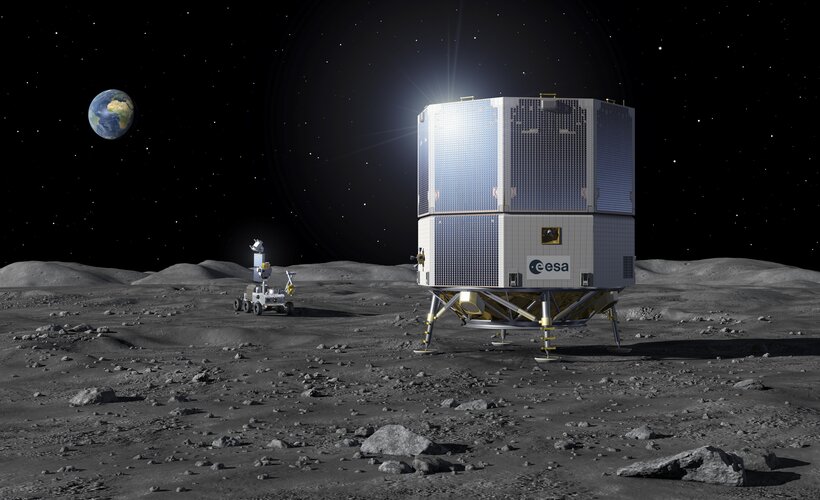
Copernical Team
Traces of ancient brine discovered on the asteroid Bennu contain minerals crucial to life
 A new analysis of samples from the asteroid Bennu, NASA's first asteroid sample captured in space and delivered to Earth, reveals that evaporated water left a briny broth where salts and minerals allowed the elemental ingredients of life to intermingle and create more complex structures. The discovery suggests that extraterrestrial brines provided a crucial setting for the development of organic
A new analysis of samples from the asteroid Bennu, NASA's first asteroid sample captured in space and delivered to Earth, reveals that evaporated water left a briny broth where salts and minerals allowed the elemental ingredients of life to intermingle and create more complex structures. The discovery suggests that extraterrestrial brines provided a crucial setting for the development of organic ESA Contracts Thales Alenia Space-Led Consortium for First Lunar Lander
 The European Space Agency (ESA) has awarded Thales Alenia Space, located in Italy, a significant contract to lead a European consortium tasked with building the Argonaut Lunar Descent Element (LDE), which will be ESA's first-ever lunar lander.
Scheduled to begin operations in the early 2030s, the Argonaut lander will serve as Europe's gateway to autonomous and adaptable access to the Moon,
The European Space Agency (ESA) has awarded Thales Alenia Space, located in Italy, a significant contract to lead a European consortium tasked with building the Argonaut Lunar Descent Element (LDE), which will be ESA's first-ever lunar lander.
Scheduled to begin operations in the early 2030s, the Argonaut lander will serve as Europe's gateway to autonomous and adaptable access to the Moon, Airbus-built SpainSat NG-I satellite successfully launched
 The first of the next-generation SpainSat satellites, SpainSat NG-I, has successfully launched aboard a Falcon 9 rocket from Cape Canaveral, USA. This advanced satellite, operated by Hisdesat for the Spanish Armed Forces, will provide Europe's most secure communications capability in UHF, Ka, and X bands. It is scheduled to begin operations in geostationary orbit in the second half of 2025, foll
The first of the next-generation SpainSat satellites, SpainSat NG-I, has successfully launched aboard a Falcon 9 rocket from Cape Canaveral, USA. This advanced satellite, operated by Hisdesat for the Spanish Armed Forces, will provide Europe's most secure communications capability in UHF, Ka, and X bands. It is scheduled to begin operations in geostationary orbit in the second half of 2025, foll Argonaut: a first European lunar lander

The European Space Agency (ESA) has signed a contract with Thales Alenia Space in Italy to lead European aerospace companies in building the Argonaut Lunar Descent Element, ESA’s first lunar lander.
ESA and European Commission to build quantum-secure space communications network

Today in Brussels, the European Space Agency (ESA) and the European Commission consolidated their cooperation on the European Quantum Communication Infrastructure (EuroQCI), marking the successful conclusion of negotiations and clearing the way for development to begin. EuroQCI is an advanced network that aims to protect everything from personal data to Europe's critical infrastructure, using proven principles of quantum physics.
Rideshare deal opens new path to space for European innovation

The best way to test new space technologies is to actually fly them in space. Today the European Space Agency signed on behalf of the European Commission a series of contracts with small satellite makers from across our continent to ensure rapid access to orbit through rideshare services for future European innovations.
UMD astronomer prepares for NASA mission to study mysterious lunar domes
 NASA has selected Firefly Aerospace to deliver the Lunar Vulkan Imaging and Spectroscopy Explorer (Lunar-VISE) payload to the enigmatic Gruithuisen Domes, located on the moon's surface. Spearheaded by the University of Central Florida (UCF) with support from partners such as the University of Maryland (UMD), this ambitious mission seeks to unravel the origins of the Domes and assess the moon's p
NASA has selected Firefly Aerospace to deliver the Lunar Vulkan Imaging and Spectroscopy Explorer (Lunar-VISE) payload to the enigmatic Gruithuisen Domes, located on the moon's surface. Spearheaded by the University of Central Florida (UCF) with support from partners such as the University of Maryland (UMD), this ambitious mission seeks to unravel the origins of the Domes and assess the moon's p Follow the water: Lunar exploration unveils ancient and cometary origins
 As humanity eyes a future beyond Earth, sustaining life on the moon has emerged as a critical challenge. Essential resources such as oxygen, food, and water will be key to success. While scientists have confirmed the presence of water on the moon, identifying its precise locations and origins remains crucial for enabling long-term habitation.
Researchers at the University of California San
As humanity eyes a future beyond Earth, sustaining life on the moon has emerged as a critical challenge. Essential resources such as oxygen, food, and water will be key to success. While scientists have confirmed the presence of water on the moon, identifying its precise locations and origins remains crucial for enabling long-term habitation.
Researchers at the University of California San UK Government backs UK orbital launch with 20 million pound investment
 The UK Government has taken a significant step in bolstering the nation's space capabilities, investing GBP 20 million into spaceflight company Orbex as part of its Series D funding round. This marks the first time the government has taken an equity stake in a UK rocket launch provider.
Announced by Department for Science, Innovation and Technology (DSIT) Secretary Peter Kyle at the 17th E
The UK Government has taken a significant step in bolstering the nation's space capabilities, investing GBP 20 million into spaceflight company Orbex as part of its Series D funding round. This marks the first time the government has taken an equity stake in a UK rocket launch provider.
Announced by Department for Science, Innovation and Technology (DSIT) Secretary Peter Kyle at the 17th E SpaceX mission to return US astronauts to happen 'soon': Trump
 US President Donald Trump said Tuesday that Elon Musk's company SpaceX will "soon" begin a mission to repatriate two American astronauts who have been stranded for months on the International Space Station.
Veteran astronauts Butch Wilmore and Suni Williams arrived at the ISS in June aboard Boeing's Starliner, and were due to spend only eight days on the orbiting laboratory, but technical pr
US President Donald Trump said Tuesday that Elon Musk's company SpaceX will "soon" begin a mission to repatriate two American astronauts who have been stranded for months on the International Space Station.
Veteran astronauts Butch Wilmore and Suni Williams arrived at the ISS in June aboard Boeing's Starliner, and were due to spend only eight days on the orbiting laboratory, but technical pr 































